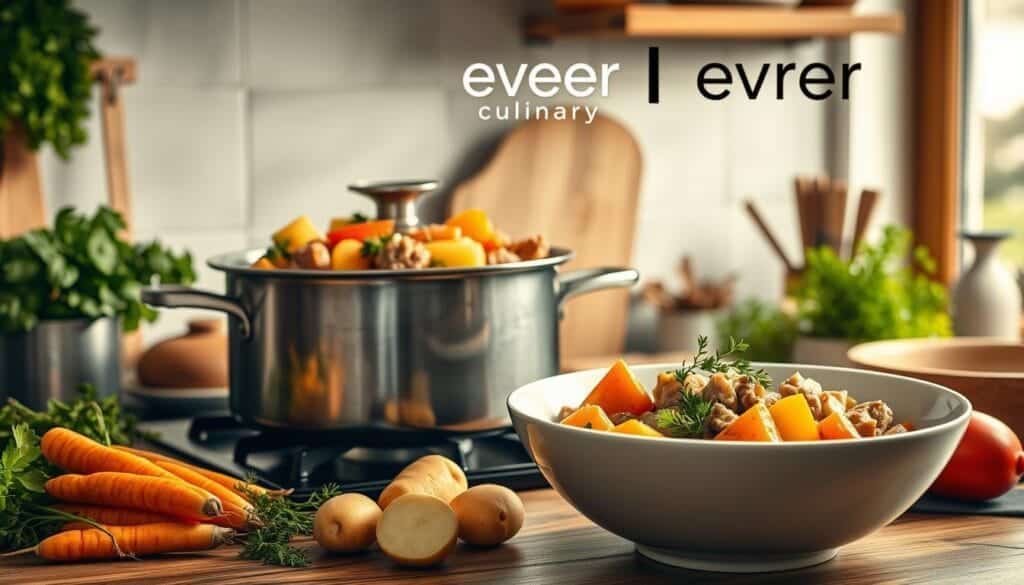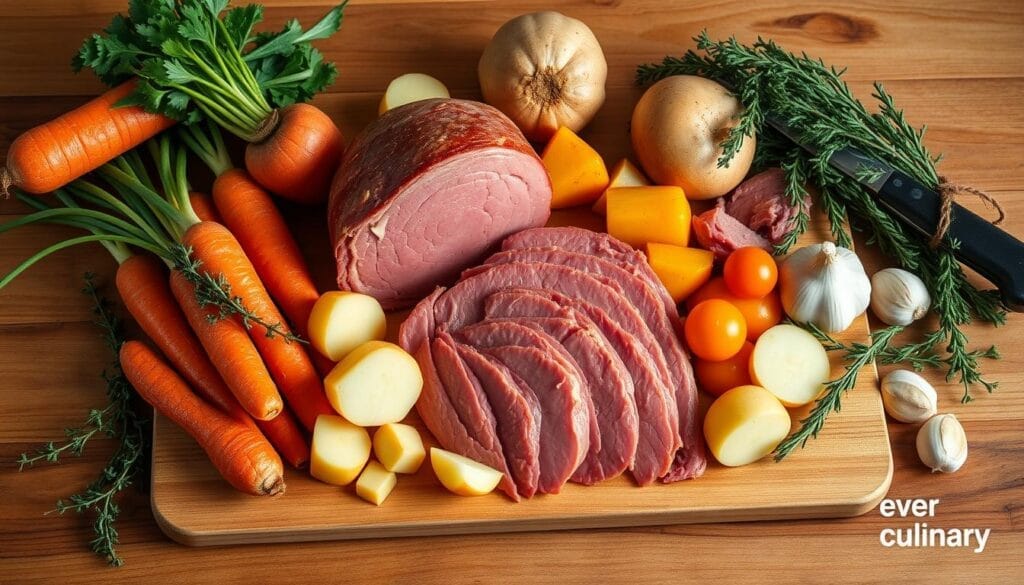Imagine a warm, comforting meal that brings your family together. A boiled dinner recipe is easy to make and full of nutrients. It includes smoked ham, root vegetables, and more.
This recipe is perfect for a cold winter day. You can make it in a slow cooker or Instant Pot for extra convenience.
A boiled dinner recipe is great for nourishing your family after a long day. You can customize it to fit your tastes and dietary needs. It’s a hearty and comforting meal that can become a family tradition.
One-pot boiled dinners are also great for busy families. They can be cooked in a slow cooker or Instant Pot with little effort and cleanup.
Table of contents
- Understanding the Classic Boiled Dinner Tradition
- Essential Ingredients for Your Perfect Boiled Dinner Recipe
- Choosing the Right Cut of Meat
- Preparing Your Vegetables and Seasonings
- Master Boiled Dinner Recipe: Step-by-Step Guide
- Essential Equipment and Kitchen Tools
- Troubleshooting Common Cooking Challenges
- Serving Suggestions and Presentation Tips
- Storage and Leftover Ideas
- Conclusion: Making Your Boiled Dinner a Family Tradition
Understanding the Classic Boiled Dinner Tradition
Boiled dinner history is rich and fascinating, tracing back to colonial America. Traditional recipes have been passed down through generations. This dish is a staple in many American homes.
The tradition centers around ingredients like corned beef, cabbage, and other vegetables. These are simmered together to create a hearty and comforting meal.
In New England, boiled dinner is especially popular. Many restaurants serve their own versions of this dish. Some recipes suggest adding flavor to the beef by boiling it with salt pork.
This makes the meal tender and flavorful. It’s both nourishing and delicious.
Origins of New England Boiled Dinner
The origins of New England boiled dinner date back to the early colonial period. Cooking was then a practical and frugal process. The dish was made with available ingredients like corned beef, vegetables, and salt pork.
These were simmered together to create a filling meal.
Cultural Significance in American Cuisine
Boiled dinner has a significant role in American cuisine, especially in New England. It’s often served at family gatherings and special occasions. Its cultural significance is reflected in its enduring popularity.
Traditional recipes have been adapted and modified over time. But the core ingredients and cooking methods remain the same.

Modern Adaptations of the Classic
Today, boiled dinner remains a beloved dish in many American households. Modern adaptations include using slow cookers and Instant Pots. These make cooking easier and more convenient.
Many restaurants also offer their own versions of boiled dinner. They use fresh and locally sourced ingredients to create a unique and delicious meal.
Essential Ingredients for Your Perfect Boiled Dinner Recipe
For a tasty boiled dinner, choose fresh and wholesome ingredients. Selecting the right ingredients and following simple steps makes it easy. Corned beef brisket and veggies like potatoes, carrots, onion, and cabbage are key.
Here are some great boiled dinner ingredients:
- Corned beef brisket
- Potatoes
- Carrots
- Onion
- Cabbage
These will help you make a hearty and comforting meal.
High-quality ingredients are vital for great flavors in your boiled dinner. Fresh vegetables and wholesome meats enhance taste and texture. With the right ingredients and a simple recipe, you’ll enjoy a delicious boiled dinner.

With the right ingredients and planning, you can make easy boiled meals for any event. Whether it’s a family meal or a special dinner, a boiled dinner recipe is perfect.
Choosing the Right Cut of Meat
Choosing the right meat for one-pot boiled dinners is key. You want it to be tender, flavorful, and perfect for slow cooking. Corned beef and brisket are top choices, but which is best for your dinner?
Think about the meat’s fat and marbling. Corned beef has more fat, making it tender and tasty. Brisket, with less fat, is leaner and healthier.
Corned Beef vs Brisket Options
Corned beef is great for boiled dinners because it cooks easily and tastes good. Brisket needs longer cooking to get tender. Here’s what sets them apart:
- Corned beef: higher fat content, easier to cook, more flavorful
- Brisket: lower fat content, longer cooking time, leaner option
Alternative Meat Selections
Consider pork shoulder or lamb shanks for different flavors. These cuts are great for slow cooking and add depth to your dinner.
Quality Indicators to Look For
When picking meat, look for USDA grade and marbling score. A high marbling score means tender and tasty meat. Choose a cut with balanced fat and lean for the best taste and texture.
By picking the right meat and considering fat and marbling, you’ll make a delicious one-pot boiled dinner. Your family and friends will love it.
| Meat Option | Fat Content | Cooking Time | Flavor Profile |
|---|---|---|---|
| Corned Beef | Higher | 2-3 hours | Rich, savory |
| Brisket | Lower | 7-8 hours | Lean, beefy |
| Pork Shoulder | Higher | 4-5 hours | Tender, unctuous |
Preparing Your Vegetables and Seasonings
For easy boiled meals, the secret is in the vegetable preparation. Pick colorful veggies like carrots, potatoes, and cabbage. They taste great and add texture and flavor to your meal.
To get ready, chop your veggies into small pieces and toss them in the pot. Add some salt, pepper, and herbs for extra taste. You can also roast or sauté your veggies before boiling for more flavor.
Here are some tips for easy boiled meals:
- Choose fresh, high-quality vegetables for the best flavor and texture.
- Don’t overcook your vegetables – they should be tender but still crisp.
- Experiment with different seasonings and herbs to find the combination that works best for you.
By following these tips and being creative, you can make a tasty easy boiled meal. It’s great for any event or a quick dinner. Vegetable preparation is key to a successful boiled dinner.
| Vegetable | Preparation Time | Cooking Time |
|---|---|---|
| Carrots | 5 minutes | 10-15 minutes |
| Potatoes | 5 minutes | 15-20 minutes |
| Cabbage | 5 minutes | 10-15 minutes |
Master Boiled Dinner Recipe: Step-by-Step Guide
To make a tasty boiled dinner, follow a simple recipe. It includes corned beef, veggies, and seasonings cooked in one pot. This method is easy and makes all flavors mix well.
Start with a high-quality corned beef brisket. You can buy a pre-cured one or cure your own. Curing takes days, but it’s worth it for the real flavor.
Initial Preparation Steps
Rinse the corned beef under cold water and dry it with paper towels. Slice the onions and crush the garlic. These will add great flavor to your dinner.
Cooking Time Guidelines
Cooking time varies based on the beef size and heat. Cook the beef for about 3 hours until it’s tender. Add carrots, potatoes, and cabbage for the last 45 minutes.
Testing for Doneness
Check if the beef is tender by slicing it. It should be easy to slice and fall apart. The internal temperature should be 160°F (71°C) for safety. Follow these steps for a delicious boiled dinner.
Essential Equipment and Kitchen Tools
To make a tasty boiled dinner, you need the right tools. A big pot, like a Dutch oven, is key for cooking corned beef and veggies. Pick a pot that fits your family size and cooking needs. A bigger pot is great for big families or big meals.
You’ll also need basic tools like a cutting board, knife, and spoon. These help when chopping veggies and seasoning the meat. Some recipes might need special tools, like a meat thermometer or slow cooker. With the right tools, your boiled dinner will be a hit with everyone.
Here are some must-have kitchen tools to start with:
- Large pot (Dutch oven or stockpot)
- Cutting board
- Knife
- Spoon
- Meat thermometer (optional)
- Slow cooker (optional)
Getting these essential tools will help you make delicious traditional dishes. They’re perfect for any family size. The right tools ensure your boiled dinner is top-notch.
Troubleshooting Common Cooking Challenges
When you’re making a boiled dinner, you might face some common problems. These can make your meal less tasty. Knowing how to fix these issues is key to making easy boiled meals.
Texture problems, seasoning issues, and temperature control are common challenges. For example, if your veggies aren’t cooked right, try cutting them smaller or cooking them longer. If your broth tastes bland, add more seasonings or aromatics.
To solve these challenges, here are some tips:
- Use a thermometer to ensure the water is at the right temperature
- Don’t overcrowd the pot, as this can affect the cooking time and texture of the ingredients
- Adjust the seasoning and spices according to your taste preferences
By following these tips, you can make tasty boiled meals. Remember, stay calm and be open to trying new things in the kitchen.
With practice and patience, you’ll get better at fixing common cooking problems. You’ll make delicious boiled dinners that everyone will love.
| Cooking Challenge | Solution |
|---|---|
| Texture problems | Adjust cooking time or cut ingredients into smaller pieces |
| Seasoning adjustments | Add more aromatics or seasonings to enhance flavor |
| Temperature control issues | Use a thermometer to ensure correct temperature |
Serving Suggestions and Presentation Tips
How you serve your one-pot boiled dinners can really enhance the experience. You can serve it family-style or individually. The goal is to make it look good and inviting.
For a classic look, use large, shallow bowls. Arrange the seafood and veggies in a nice way. Add lemon wedges, fresh herbs, or melted butter for extra flavor and style. Serving bread like Anise Bread or Parmesan Buttermilk Cornbread is also a great idea.
Traditional Plating Methods
- Use large, shallow bowls to contain the broth and arrange the seafood and vegetables
- Add garnishes like lemon wedges, fresh herbs, or melted butter
- Serve bread on the side, such as Anise Bread, Herb Quick Bread, or Parmesan Buttermilk Cornbread
Modern Presentation Ideas
For a modern twist, use colorful bowls and creative garnishes. Edible flowers or microgreens can add a pop of color. Serving it in a communal style is also fun and interactive. It’s great for special occasions or gatherings.
Storage and Leftover Ideas
It’s important to store leftovers safely to keep them fresh and safe to eat. You can keep boiled dinner leftovers in an airtight container in the fridge for 3-4 days. Or, you can freeze them for up to 3 months for the best taste.
One fun way to use leftovers is to make corned beef hash. Just chop the leftover corned beef and mix it with onions, bell peppers, and potatoes. Then, pan-fry it until it’s crispy and golden. You can also use the leftover broth to make a tasty soup with veggies and noodles.
Other ideas include making Reuben sandwiches, adding leftover corned beef to salads or wraps, or topping a baked potato with it. The options are endless, and a bit of creativity can turn leftovers into a new meal.
Here are some tips for storing and reheating leftovers:
- Store leftovers in airtight containers to prevent contamination and spoilage.
- Label and date the containers so you can easily keep track of how long they’ve been stored.
- Reheat leftovers to an internal temperature of at least 165°F to ensure food safety.
- Use leftovers within 3-4 days of storage, or freeze them for up to 3 months.
| Storage Method | Storage Time |
|---|---|
| Refrigerator | 3-4 days |
| Freezer | up to 3 months |
By following these tips and getting creative with your leftovers, you can enjoy your boiled dinner recipe for days to come. Plus, you’ll reduce food waste.
Conclusion: Making Your Boiled Dinner a Family Tradition
The classic boiled dinner is more than just a tasty meal. It’s a tradition that brings families closer. By adding this hearty dish to your meals, you create lasting memories and a sense of unity that lasts through generations.
Thanks to modern meal delivery services, making boiled dinner a family favorite is easier. These services offer top-quality ingredients that save you time. This lets you enjoy cooking and sharing meals with your loved ones.
Studies show that families who use meal delivery services have more family dinners. They also feel more connected and have better well-being. By embracing this traditional recipes, you get to enjoy quality time together. This strengthens the family meals that are key to a cherished culinary heritage.
FAQ
What is a boiled dinner?
A boiled dinner is a simple meal made in one pot. It includes meat, veggies, and seasonings. All these are cooked together to make a comforting, nutritious meal for families.
What is the history and cultural significance of boiled dinners?
Boiled dinners come from New England cuisine. They’ve been a favorite in American families for many years. This dish shows the region’s culinary traditions and the value of hearty meals for families.
What are the essential ingredients for a boiled dinner?
The key ingredients for a boiled dinner are a main protein like corned beef, and root and cruciferous veggies. These ingredients make a nourishing, easy meal in one pot.
What are the differences between corned beef and brisket for a boiled dinner?
Corned beef and brisket are both good for boiled dinners but differ. Corned beef is cured, while brisket is tougher and needs longer cooking. Your choice depends on taste and desired flavor.
How should I prepare the vegetables and seasonings for a boiled dinner?
Preparing veggies and seasonings is key for a boiled dinner. Chop veggies evenly and pick the right seasonings. Good prep makes the dish flavorful and enjoyable.
What is the step-by-step process for cooking a boiled dinner?
Cooking a boiled dinner involves prep, adding ingredients to a pot, and simmering. Use a reliable recipe to ensure a tasty, satisfying meal.
What equipment and kitchen tools are needed for a boiled dinner?
You’ll need a big pot, a sharp knife, and a meat thermometer for a boiled dinner. The right tools make cooking easier and improve results.
How can I troubleshoot common cooking challenges with a boiled dinner?
Common issues with boiled dinners include texture and seasoning problems. Knowing how to fix these can help you make delicious meals every time.
How can I serve and present a boiled dinner?
Boiled dinners can be served in many ways. Traditionally, they’re served family-style. For a modern twist, plate each component separately or arrange them nicely on a plate.
How can I store and use leftovers from a boiled dinner?
Leftover boiled dinner parts can be stored for days. Use the meat in hash or soups, and reheat the veggies. This way, you get the most out of your meal.

